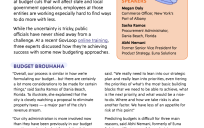 It’s hard to imagine the learning and development world without eLearning anymore, but it wasn’t that long ago that the number of naysayers to eLearning far outweighed those willing to take the leap into this new training delivery mode.
It’s hard to imagine the learning and development world without eLearning anymore, but it wasn’t that long ago that the number of naysayers to eLearning far outweighed those willing to take the leap into this new training delivery mode.
I was an early adopter and launched my first eLearning development company all the way back in 2001; three years before Facebook existed, and four years before Twitter. Wow. That’s a long time ago!
Development tools in 2001 were scarce, limited, and complicated to use. In fact, the only development software available cost around $1,500 per license. Avenues for sharing our creations were limited to mailing a CD or giving a live demo, but not of content inside a learning management system because the first one of those was released just a year earlier and wasn’t widely used.
As a developer at that time, my skills were rare. For a little while, I was one of just two people in the entire state who had the skills to develop eLearning.
If we jump ahead nearly two decades, we see a completely different picture, one that probably none of us would have imagined. eLearning development tools are everywhere, including on mobile devices, and the same can be said for learning management systems. Marketing a new course or innovative new approach is a series of well thought out social media posts away and distribution happens from the cloud straight to the user — and on to whatever device they choose.
Which brings me to today, and my thoughts about a recent discussion with the state of Nebraska Training & Development team. We are a small and mighty group with a depth and breadth of collective skills that rivals much larger training groups. Two of us have the skills to develop eLearning and the demand for this kind of work is increasing rapidly. As a group, we were questioning just how much of this work we could take on.
It’s an ongoing discussion but here are a few things I thought I’d share with you, in case you are in a similar situation.
- Develop a formal development request process. This is a good idea even if you do just a handful of projects annually. Develop your process and request form and you’ll have a great jumping off point for understanding the scope of each project. This will also help you prepare some precise questions for your first consultation for the project, which will save everyone some time right up front.
- Evaluate each request thoroughly. So far, the eLearning development work we have taken on as a team has been what I will call one-off requests. The projects have been small and manageable enough that we didn’t bother to do much in the way of evaluating the requests. As the requests continue to roll in, we know that we will need to evaluate each thoroughly in terms of complexity and scope to determine if we have the time and personnel to complete them before committing.
- Prepare an internal agreement. If you decide you can handle a new request it’s a good idea to have an internal agreement ready to go so all parties involved know what to expect in terms of time, cost, and rework.
- Don’t be afraid to say no. As a department within a government agency, we can’t produce a profit, but we can charge internal customers for the cost of developing each project. When a new request comes in and it looks like it’s more than your team can handle at the moment, don’t be afraid to say no, or to ask for the project start to be delayed. Saying no upfront will save everyone the headache of delays because your team took on more than it could handle.
- Communicate. This can be overlooked because you and your team are working to complete the project. If no one is asking about it, then surely they must understand, right? Not so much. Make a plan to communicate with stakeholders at each step of the project. Asking questions, answering questions or concerns and even sharing a sneak-peek of the project will send the message that you are working on their behalf to create exactly what they need.
I may share about this again as our team discussions continue. Do you have an eLearning project development process you’d like to share? Feel free share your comments.
Lisa Menke is a GovLoop Featured Contributor. She is a digital media developer who is passionate about the intersection where opportunities for professional growth and participatory culture meet. As a training specialist for the State of Nebraska, Lisa is currently responsible for the creation of digital media in support of agency training & development, and communications. Read her posts here.





Leave a Reply
You must be logged in to post a comment.